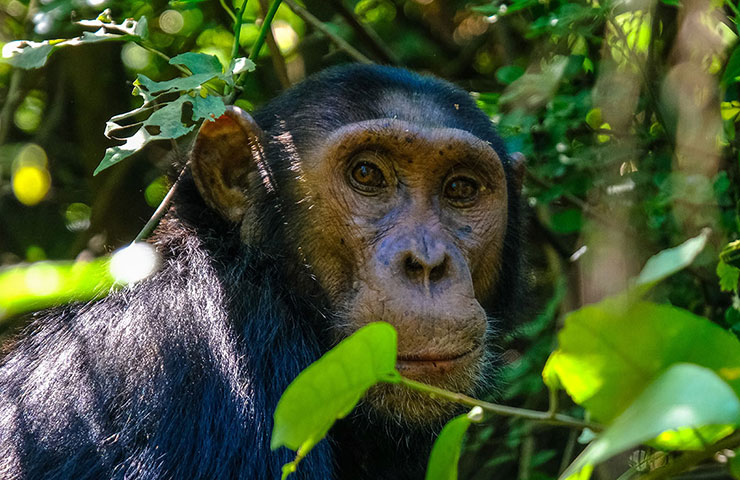Nyungwe Forest chimpanzee facts showcase the uniqueness and allure of these remarkable species. Nyungwe Forest, nestled in the heart of Rwanda, is a haven of extraordinary biodiversity, and within its lush green depths reside the remarkable Nyungwe Forest chimpanzees. These magnificent creatures, known for their intelligence, social behavior, and captivating charm, offer an awe-inspiring experience for adventurous travelers.
Nyungwe Forest chimpanzee facts involve Pan troglodytes, which are part of a thriving population within the forest, estimated to be around 500 individuals. These highly intelligent primates share approximately 98.7% of their DNA with humans, allowing us to draw intriguing parallels between our species. Observing these chimpanzees in their natural habitat provides a profound insight into our evolutionary roots and fosters a deep sense of connection with our wild kin.
Nyungwe Forest chimpanzees are renowned for their complex social structures and do exhibit a fascinating hierarchy. Led by an alpha male who maintains his position through strength and strategic alliances, each group consists of multiple females, their offspring, and a few subordinate males.
One of the most striking Nyungwe Forest chimpanzee facts is their remarkable tool usage.
These resourceful primates have been observed fashioning and employing various tools to solve problems and procure food. They utilize sticks to extract termites from their mounds, stones to crack open nuts, and leaves as sponges to soak up water. Such ingenuity showcases their exceptional cognitive abilities.
Nyungwe Forest chimpanzee facts on feeding
This show that chimpanzees not only feed on fruits and leaves but also hunt small mammals, such as monkeys and duikers. This dietary versatility reflects their adaptability and resourcefulness in the face of ever-changing environmental conditions. Chimpanzees in Nyungwe Forest have an omnivorous diet, consuming a variety of foods. Their diet primarily consists of fruits, leaves, seeds, flowers, and bark. They also hunt small mammals and insects for protein.
Nyungwe Forest Chimpanzees have a rich repertoire of vocalizations, including hoots, screams, and barks. These sounds serve as a means of communication, enabling them to convey emotions, coordinate group activities, and warn of potential threats.
Nyungwe Forest Chimpanzee Facts show how chimpanzees construct nests in trees for sleeping and resting. These nests are carefully crafted using branches, leaves, and other vegetation. Each night, the chimpanzees build new nests, demonstrating their resourcefulness and adaptability. Chimpanzees are listed as endangered on the IUCN Red List of Threatened Species.
Due to deforestation, illegal hunting, and disease outbreaks pose significant threats to their survival. Efforts are being made to protect and conserve the chimpanzee population in Nyungwe Forest through conservation initiatives and strict regulations.
To safeguard these extraordinary beings, conservation efforts within the Nyungwe Forest are of the utmost importance. Local initiatives aim to protect their habitat, minimize human-wildlife conflict, and promote sustainable tourism practices.
In conclusion, the Nyungwe Forest chimpanzees epitomize the wonders of the natural world, inviting adventurous souls to partake in an unforgettable journey of discovery. With their uncanny intelligence, intricate social structures, tool usage, and dietary versatility, these primates provide a captivating experience for any nature enthusiast.

